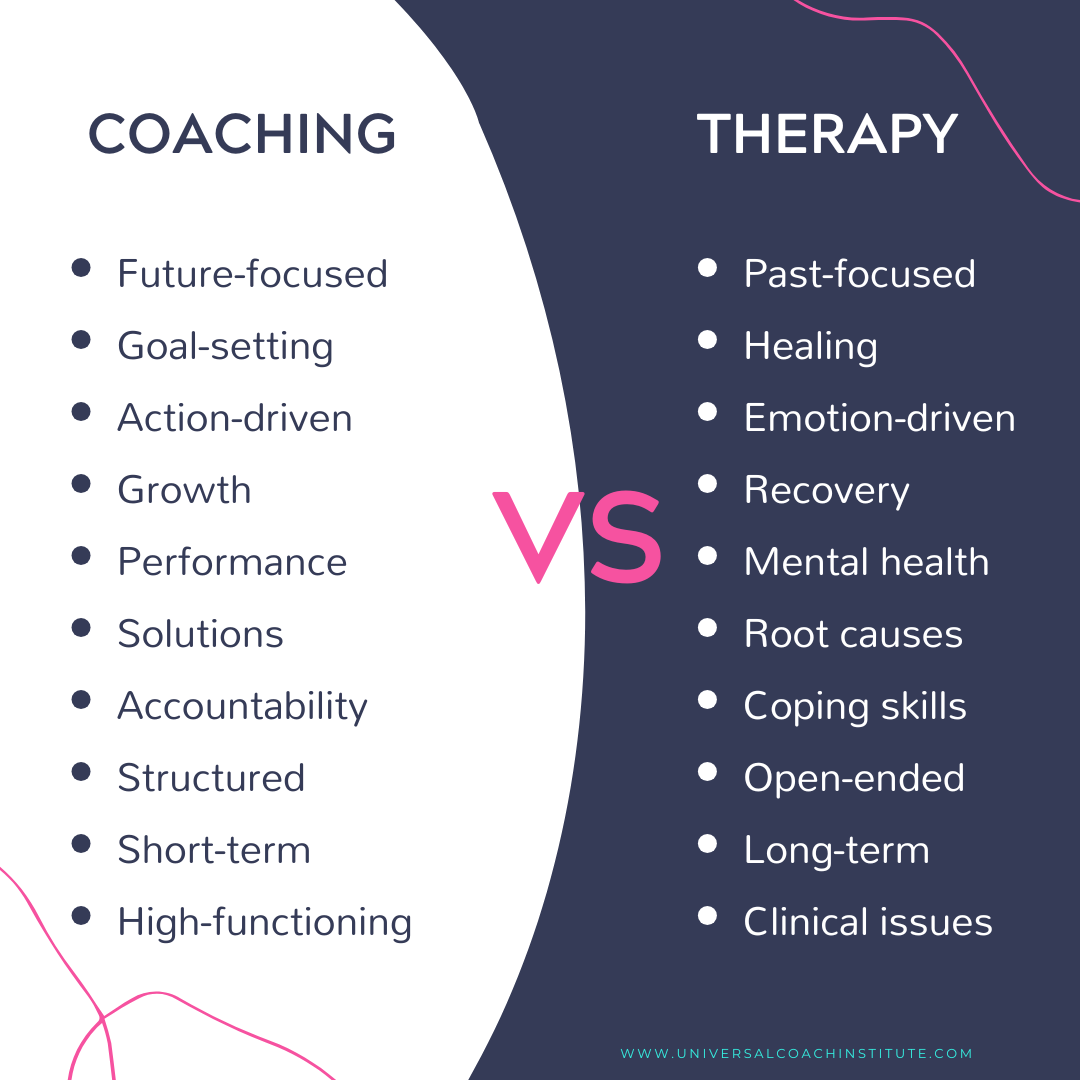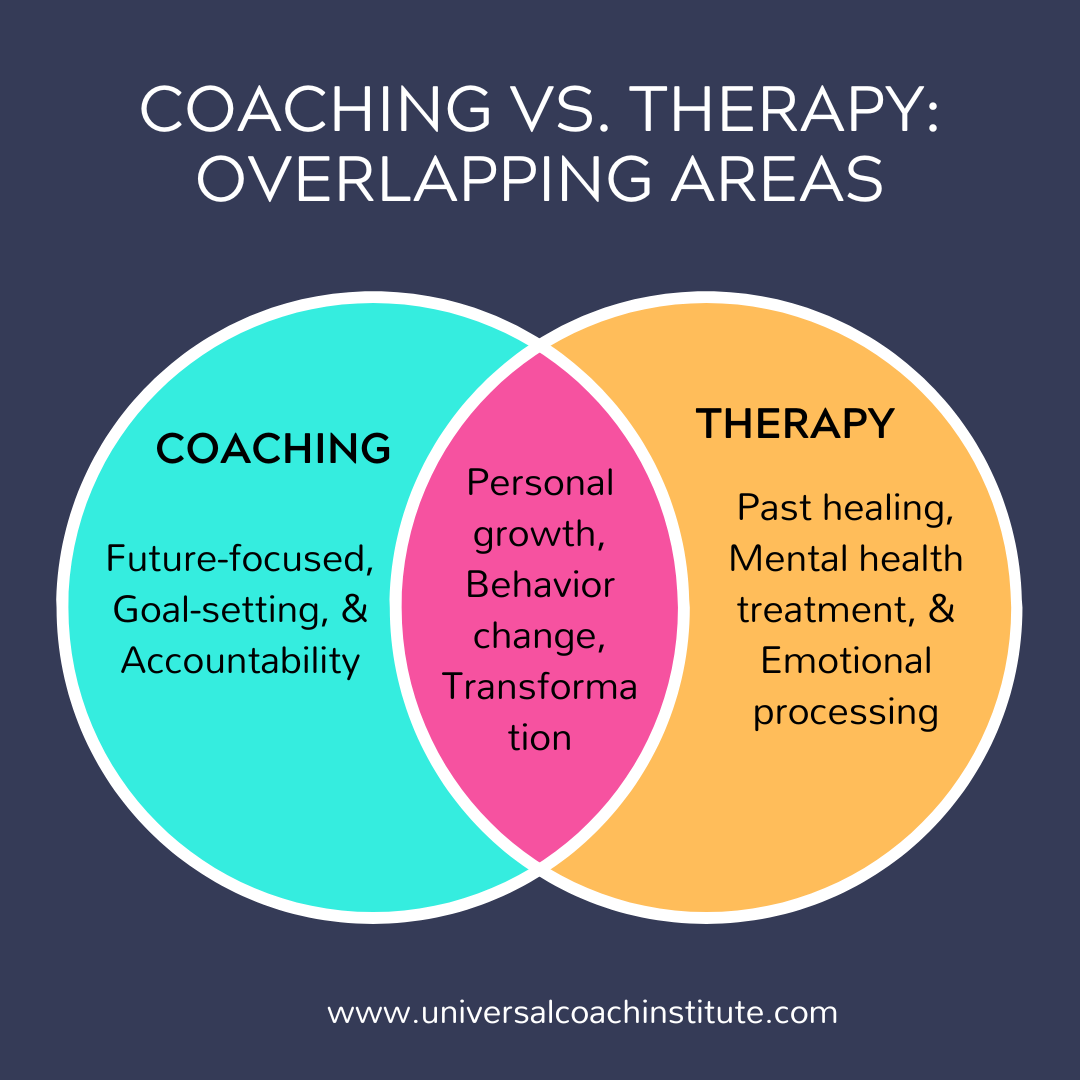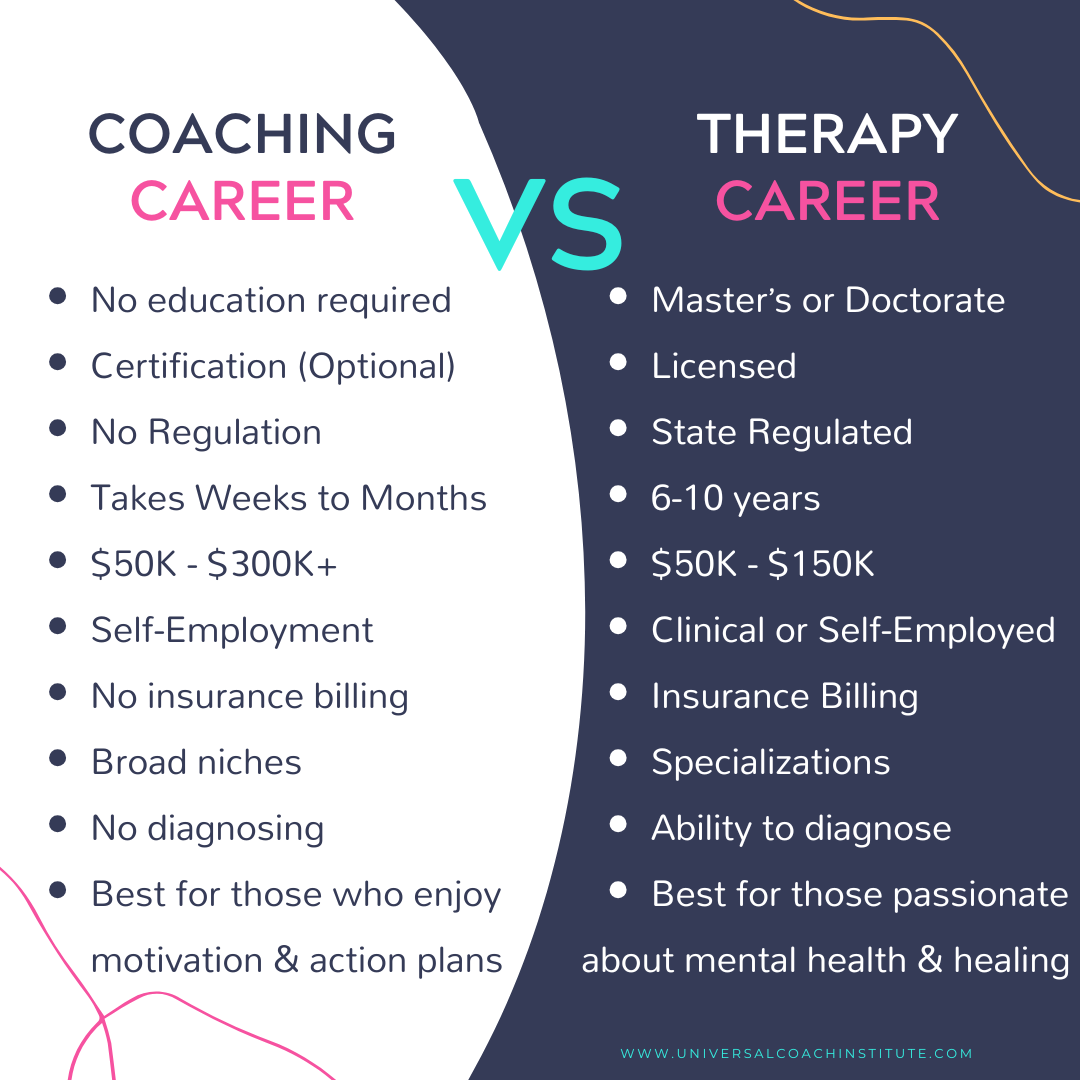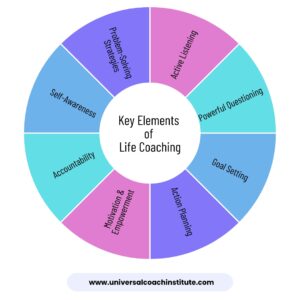Coaching and therapy both aim to improve your life, but they work in different ways. Coaching focuses on setting goals and finding solutions for the future. Therapy addresses past issues and heals emotional wounds.
Understanding the difference between coaching and therapy helps people choose the right support for their specific needs. People seeking personal development should consider what they truly need before choosing a path.
In addition, those considering a career in coaching or therapy must understand key differences. Choosing the right profession depends on your interests, training commitment, and the type of impact you want to make.
To better understand these differences, let’s start by exploring what coaching is and how it works. Then, we will dive into therapy.
What is Coaching?
Coaching is a powerful process that helps people grow and achieve their goals. It focuses on building skills, overcoming obstacles, and maximizing potential through structured guidance and support.
Definition of Coaching – Coaching As A Structured, Goal-Oriented Process
Coaching is a collaborative partnership between a coach and a client designed to inspire growth and development. Unlike advice-giving, coaching helps people discover their own answers through powerful questions and reflection.
At its core, coaching is future-focused and action-oriented. Coaches help clients identify where they want to go and create practical steps to get there.
The coaching relationship is built on trust, confidentiality, and belief in the client’s potential. Coaches don’t tell clients what to do but rather help them uncover their own wisdom and solutions.
Most coaching follows a structured format with regular sessions, clear objectives, and accountability measures to track progress.
Types Of Coaching
- Life Coaching – Life coaching focuses on personal growth, life balance, and finding purpose. Life coaches help clients navigate transitions, improve relationships, and increase overall well-being and happiness.
- Career Coaching – Career coaching specializes in professional development, including job searches, promotions, career changes, and workplace challenges. Career coaches help clients build skills, improve performance, and find fulfilling work.
- Executive Coaching – Executive coaching targets leadership development for managers and executives. These coaches help leaders improve decision-making, communication, and team management skills.
- Health Coaching – Health coaching supports clients in achieving wellness goals through behavior change, habit formation, and motivation.
- Specialty Coaching – Specialist coaching includes financial, relationship, transformational, spiritual, and mindset coaching, each addressing specific life domains.
Who Benefits From Coaching?
Coaching benefits individuals who are ready to take action and create meaningful change. It provides guidance, accountability, and structure to help people navigate transitions, overcome challenges, and reach their full potential.
- Professionals seeking career growth
- Entrepreneurs and business owners
- Organizations and teams
- Individuals feeling stuck or unfulfilled
- People navigating life transitions
- Anyone committed to self-improvement
Coaching Techniques & Methods
- Powerful Questioning forms the foundation of coaching. Open-ended questions prompt deeper thinking and help clients discover their own insights.
- Goal Setting using frameworks like SMART goals (Specific, Measurable, Achievable, Relevant, Time-bound) creates clear targets and motivation.
- Action Planning breaks larger goals into manageable steps with specific timelines and accountability measures.
- Strengths Assessment helps clients identify and leverage their natural talents rather than focusing only on weaknesses.
- Visualization techniques help clients imagine successful outcomes and build confidence in their ability to achieve them.
- Reflective Practice encourages clients to examine their thoughts, beliefs, and behaviors to identify patterns and opportunities for growth.
- Positive Psychology approaches focus on building on what works rather than just fixing problems. This includes gratitude practices and strengths-based development.
What is Therapy?
Therapy is a structured approach to treating mental health issues through professional guidance and evidence-based methods. It provides a safe space for people to address emotional challenges and develop healthier coping strategies.
Definition Of Therapy – Therapy As A Clinical Intervention For Mental Health
Therapy, also known as psychotherapy or counseling, is a clinical intervention delivered by licensed mental health professionals. It treats psychological disorders and improves mental well-being. Unlike casual conversations with friends, therapy follows structured approaches based on psychological theories and research.
A therapist creates a confidential environment where clients can explore their thoughts, feelings, and behaviors without judgment. The therapeutic relationship between client and therapist forms the foundation for healing.
The primary goal of therapy is to help people understand their challenges, develop coping skills, and make positive changes in their lives. It addresses various mental health conditions, including anxiety, depression, PTSD, and addiction.
Therapy differs from psychiatry in that therapists typically don’t prescribe medication, focusing instead on talk-based interventions. However, many clients benefit from combining therapy with medication when appropriate.
Types Of Therapy
Many therapy approaches exist to address different needs and preferences. Each type has its own framework and techniques.
Common therapy types include:
- Cognitive Behavioral Therapy (CBT): Focuses on identifying negative thought patterns and changing unhelpful behaviors
- Psychodynamic Therapy: Explores unconscious processes and how past experiences affect current behavior
- Humanistic Therapy: Emphasizes personal growth and self-actualization
- Family Therapy: Treats the family as a system and improves communication patterns
- Dialectical Behavior Therapy (DBT): Combines CBT with mindfulness for emotional regulation
Some therapies are brief and solution-focused, lasting just a few sessions. Others are longer-term, providing ongoing support for complex issues like trauma or personality disorders.
Research has supported the effectiveness of evidence-based therapies for specific conditions. A therapist may combine approaches to create a personalized treatment plan.
Who Benefits From Therapy?
Therapy serves people across all demographics facing various mental health challenges. It’s not limited to those with diagnosed mental illness or severe symptoms.
People often seek therapy for:
- Managing anxiety or depression
- Processing grief or major life transitions
- Healing from trauma or abuse
- Addressing relationship difficulties
- Coping with chronic illness or pain
- Overcoming addiction
- Dealing with work-related stress or burnout
Contrary to outdated stigma, seeking therapy indicates strength, not weakness. It shows a commitment to personal growth and well-being.
Children and adolescents benefit from specialized therapeutic approaches tailored to their developmental stages. Elderly individuals may use therapy to navigate age-related transitions.
Therapy can be valuable even for those without obvious mental health symptoms who simply want to understand themselves better or improve their quality of life.
Therapy Techniques & Methods
Therapists employ various techniques to facilitate healing and growth, choosing methods appropriate for each client’s needs.
Common therapeutic techniques include:
- Active listening: Fully attending to clients with empathy and without judgment
- Cognitive restructuring: Identifying and changing unhelpful thought patterns
- Exposure therapy: Gradually facing fears in a controlled environment
- Mindfulness practices: Developing awareness of present-moment experiences
- Role-playing: Practicing new behaviors in a safe setting
Key Differences Between Coaching and Therapy
While both coaching and therapy support personal growth and well-being, their approaches, methods, and objectives differ significantly. Coaching is action-driven. It emphasizes goal-setting, accountability, and performance optimization. Therapy is healing-focused. It addresses mental health disorders, emotional trauma, and deep-seated psychological challenges. The table below outlines the key differences between the two professions.
Focus And Approach
Coaching is typically performance-focused and primarily focuses on the present and future. Coaches help clients achieve specific goals through action-oriented strategies. It emphasizes accountability and measurable outcomes. They only work with functional individuals who want to improve their performance or reach certain objectives.
Therapy, in contrast, often explores the past to address present issues. Therapists help clients understand how past experiences shape current behavior and emotional patterns. They work with functional and dysfunctional individuals who must focus on emotional healing, self-awareness, and psychological resilience.
The approaches differ significantly in their orientation.
Coaches typically ask, “What’s next?” while therapists might ask, “Why is this happening?”
Client Needs & Goals
Coaching serves clients who generally function well but seek to enhance performance or achieve specific outcomes. These individuals typically want guidance in personal and professional development.
Therapy addresses deeper psychological needs. It often helps clients who experience significant distress or mental health concerns. This includes difficulty functioning in daily life.
The goals in coaching tend to be concrete and measurable. For example, a coach might help someone develop better time management habits or improve their leadership skills.
Therapy goals often involve healing and developing a better understanding of oneself. For example, a therapist might help someone work through trauma or manage depression symptoms.
Regulation & Certification
Therapy requires strict licensing and regulation. Mental health professionals must complete extensive education, typically including a master’s or doctorate degree, supervised clinical hours, and licensing examinations.
Licensed therapists must adhere to licensing boards’ requirements and can often accept insurance for their services. They follow strict ethical guidelines regarding client relationships and confidentiality.
Coaching has fewer formal regulations. While respected organizations like the International Coaching Federation (ICF) offer certification programs, these are not legally required to practice.
Many coaches complete training programs and earn certificates, but the industry lacks the standardized requirements that exist in therapy. This creates significant variation in coaching qualifications and approaches.
Duration & Commitment
Coaching relationships typically follow a more structured timeframe. Many coaching engagements last between 3-6 months, with clear milestones and endpoints based on achieving specific goals.
Sessions often occur weekly or bi-weekly. They may include homework and action steps between meetings. The focus remains on forward movement and measurable progress.
Therapy may continue for longer periods. It can extend for years, depending on the client’s needs. The timeline is often open-ended. It’s adjusted based on the client’s healing process.
Therapy sessions usually happen weekly. This creates a consistent support structure. Progress in therapy may be less linear than in coaching. This is because breakthroughs occur at unpredictable intervals.
Techniques & Methods
Coaches employ techniques centered on accountability, goal-setting, and behavior change. They might use tools like SMART goals and action plans to help clients achieve desired outcomes.
Coaching methods often include powerful questioning, active listening, and challenging limiting beliefs. The work focuses on identifying obstacles and creating strategies to overcome them. They may use evidenced-based techniques depending on their coach training.
Therapists utilize evidence-based techniques like Cognitive Behavioral Therapy (CBT), psychodynamic approaches, or EMDR. These methods address underlying psychological patterns and emotional processing.
Many therapists receive specialized training in specific therapeutic modalities. Their techniques aim to create deeper understanding and healing rather than just behavioral change.
Coaching vs. Therapy

| Aspect | Coaching | Therapy |
|---|---|---|
| Focus | Future-oriented, goal-driven, and action-based | Past and present-focused, emotional healing, and mental health support |
| Approach | Performance coaching, habit formation, and self-improvement | Cognitive restructuring, trauma processing, and emotional regulation |
| Client Type | High-functioning individuals seeking personal or professional growth | Individuals experiencing mental health challenges or emotional distress |
| Primary Goal | Achieving specific outcomes in career, business, relationships, or personal development | Understanding, processing, and healing emotional or psychological issues |
| Timeframe | Short-term (3-6 months) or ongoing based on goals | Can be long-term, depending on the complexity of mental health concerns |
| Intervention Level | Non-clinical, focused on self-directed change | Clinical, may involve diagnosis and structured treatment plans |
| Methods Used | Action plans, SMART goals, accountability frameworks | Cognitive Behavioral Therapy (CBT), mindfulness, talk therapy |
| Problem-Solving Style | Solution-focused, proactive strategies | Process-driven, deep emotional exploration |
| Regulation & Credentials | Unregulated industry, certifications | Regulated profession, requires licensure (LCSW, LPC, LMFT, Psychologists) |
| Who Provides It? | Certified coaches, mentors, leadership trainers | Licensed therapists, clinical psychologists, counselors |
| Best For | Career growth, leadership development, mindset shifts, and habit-building | Trauma recovery, depression, anxiety, and personality disorders |
| Common Techniques | Powerful questioning, strengths assessments, habit stacking | Cognitive restructuring, emotional processing, somatic therapy |
| Financial Considerations | Often out-of-pocket, rates vary widely | May be covered by insurance depending on provider and state |
| Session Structure | Goal-driven, structured, and measurable | Process-oriented, tailored to client needs and therapy model |
| Homework Assignments | Action steps, reflection exercises, accountability tasks | Journaling, cognitive exercises, behavioral assignments |
| Outcome Measurement | Progress tracking, goal completion, performance improvement | Emotional stability, behavioral changes, symptom reduction |
| Ideal Candidate | Someone looking for direction, motivation, or skill development | Someone struggling with unresolved emotions, trauma, or mental health concerns |
| Does It Address Trauma? | No, coaches do not treat trauma | Yes, therapists are trained in trauma-focused interventions |
| Can It Include Emotional Support? | Limited, focuses on motivation and accountability | Yes, includes emotional support and crisis intervention |
| Legal & Ethical Boundaries | No authority to diagnose or treat mental health disorders | Legally responsible for ethical treatment and confidentiality |
Can Coaching and Therapy Overlap?
While coaching and therapy have distinct roles, they can sometimes complement each other. For example, a client in therapy for anxiety might also see a career coach. They can work on building confidence for job interviews. Similarly, someone in therapy for trauma recovery may later transition to life coaching to rebuild self-esteem. The key is ensuring ethical boundaries. Coaches cannot diagnose or treat mental health conditions. And while therapists may help clients set goals, their focus is on mental health. Not structured performance strategies.
Professional boundaries may blur in certain situations as both aim to help clients improve their lives through different approaches.
When Coaching and Therapy Work Together
Coaching and therapy can complement each other effectively. For example, a client might work with a therapist to address past trauma. At the same time, they may work with a coach to develop leadership skills. This collaborative approach creates a comprehensive support system.
Some clients transition between services as their needs evolve. For example, a person might seek coaching to build confidence in professional settings after making progress in therapy addressing anxiety.
The key to successful integration lies in clear communication between providers and with client consent. This ensures consistent support without conflicting guidance.
How do I know if I need coaching or therapy?
If you’re unsure whether you need coaching or therapy, start by identifying your goals. Are you looking for personal growth, career development, or improved productivity? If so, a coach can help. But if you’re struggling with anxiety, depression, or past trauma, therapy is the better choice. Below are key questions to help you decide.
Key Questions To Ask Yourself
What are your primary goals?
- If you want to focus on personal or professional development, coaching may be a better fit.
- If you need accountability and a structured plan to reach personal or professional goals, coaching is a great option.
- If you need to heal from past trauma, therapy is the right choice.
- If you require a clinical diagnosis or mental health treatment, therapy is necessary.
How urgent is your situation?
If you’re experiencing significant distress or impairment in daily functioning, therapy is likely more appropriate. Coaching works better for stable individuals seeking improvement.
What’s your budget and time commitment?
Therapy might be covered by insurance, while coaching typically isn’t. Therapy often requires longer-term commitment, whereas coaching relationships can be shorter and more flexible.
Do you have mental health concerns?
Diagnosed conditions or symptoms like depression, anxiety, or trauma require professional therapeutic support, not coaching.
Signs You Need Coaching
- You’re feeling stuck but functional. You manage daily responsibilities adequately but feel you could achieve more with proper guidance.
- You have specific goals. Whether career advancement, improved leadership skills, or better work-life balance, coaching thrives on concrete objectives.
- You’re ready for accountability. Coaches provide structure through regular check-ins and action plans that keep you moving forward.
- You want strategy more than healing. Your focus is on developing new skills and strategies rather than processing emotional wounds.
- You’re in a transition period. Major life or career changes benefit from coaching’s future-oriented approach.
Signs You Need Therapy
- You’re experiencing persistent emotional distress. Ongoing feelings of sadness, anxiety, or emptiness that interfere with daily life require therapeutic attention.
- Past trauma impacts your present. Unresolved experiences create patterns that therapy can help address and heal.
- Your relationships suffer consistently. Recurring conflicts or attachment issues benefit from therapy’s deeper exploration.
- You engage in harmful behaviors. Substance misuse, self-harm, or other destructive patterns need therapeutic intervention.
- You lack emotional regulation skills. Difficulty managing strong emotions or frequent mood swings suggests therapy would be beneficial.
- You’re considering medication. Only licensed mental health professionals can determine if psychiatric medication might help your situation.

Should I become a coach or a therapist?
If you’re passionate about helping others grow, you may be considering a career as a coach or a therapist. While both professions focus on personal development and transformation, they differ in approach, training, and professional responsibilities.
Becoming a coach is ideal for those who enjoy motivating, guiding, and holding others accountable to their goals. Coaching is a non-clinical profession.
Becoming a therapist is the right path if you want to help people address mental health conditions, trauma, and emotional challenges. Therapy is clinical-based.
Education & Training: Coaching vs Therapy
Coaching requires no formal degree. However, most coaches complete coach certification training to build credibility. Universal Coach Institute (UCI) is an ICF-approved Continuing Education training provider. We offer comprehensive programs that equip coaches with essential skills. Schools like UCI follow ICF standards, ensuring high-quality education in coaching methodologies. Training typically takes a few weeks to a year, depending on the certification level and specialization.
Learn more about UCI’s Life Coach Certification.
On the other hand, therapists must earn a bachelor’s degree and a master’s or doctoral degree. They also need clinical training hours and state licensing. The process can take 6 to 10 years before practicing independently. Licensing requirements vary by state. Therefore, it’s important to check with your state’s regulatory board for specific guidelines.
Key Questions to Ask Yourself
- Do you want to help people set and achieve goals or help them heal and process emotions?
- Are you more interested in personal growth and performance or mental health and emotional well-being?
- Do you want to use structured coaching techniques or clinical therapy methods?
- Are you willing to complete extensive education and licensing for therapy, or do you prefer the flexibility of coach certification?
Coaching vs. Therapy Career

| Factor | Coaching | Therapy |
|---|---|---|
| Education Required | No formal degree required; certification programs (3-12 months) | Bachelor’s + Master’s or Doctorate, 1,500-3,000 clinical hours, state licensure |
| Time to Start Practicing | 3 months to 1 year (depending on certification) | 6 to 10 years (including education, clinical hours, and licensing) |
| Cost of Education | $2,000 – $15,000 for certification | $50,000 – $200,000 for degrees and licensing |
| Regulation & Licensing | Unregulated, but certifications add credibility | Regulated, requires state licensure (LPC, LCSW, LMFT, PhD/PsyD) |
| Work Focus | Goal-setting, personal growth, mindset shifts, career or business development | Healing trauma, mental health treatment, emotional processing |
| Typical Clients | High-functioning individuals looking for guidance, motivation, and structure | People struggling with emotional distress, trauma, anxiety, or depression |
| Income Potential | Varies widely; $40,000 – $150,000+ depending on niche and business model | Typically $50,000 – $120,000; private practice may earn more |
| Career Flexibility | Can work independently, set own hours, no state restrictions | Regulated practice, may require supervision or clinical setting |
| Best For | Entrepreneurs, self-starters, those who enjoy personal development and motivation | Those passionate about psychology, mental health, and emotional well-being |
| Challenges | Must build own credibility, no state licensing, business skills required | Extensive education, licensing exams, ongoing supervision in some states |
| Can Transition to the Other? | No direct path to becoming a therapist without additional degrees | Yes, a therapist can become a coach (with ethical boundaries in place) |
Can a Therapist Be a Coach?
Yes, many therapists transition into coaching or offer coaching alongside their therapy practice. Because therapists are trained in behavioral psychology, they often bring valuable expertise to coaching.
However, there are important distinctions to maintain:
- A therapist must clearly separate their roles when providing coaching services. Coaching is not a substitute for therapy, and clients should understand the difference.
- Some licensing boards restrict therapists from offering coaching services unless they follow specific ethical guidelines.
- Therapists working as coaches should avoid diagnosing, treating, or addressing mental health conditions in their coaching sessions.
Many therapists shift to coaching because it offers more flexibility. Also, it has fewer legal restrictions and a future-focused approach. For example, a therapist specializing in career stress might transition into executive coaching. A mental health counselor might also start a life coaching business.
If you’re already a therapist and want to become a coach, consider life coach training to understand the coaching methodology and business strategies involved.
Frequently Asked Questions
Can a coach replace a therapist?
No, a coach cannot replace a therapist. Coaching and therapy serve different purposes. A therapist is trained to diagnose and treat mental health conditions. They help with emotional trauma and psychological disorders. In comparison, a coach focuses on goal-setting, habit-building, and performance improvement. If someone is dealing with trauma, anxiety, depression, or other mental health issues, they should seek therapy. A coach can support personal and professional growth while mental health concerns are being addressed.
Is life coaching just unlicensed therapy?
No, life coaching is not unlicensed therapy. Therapy is a regulated profession requiring state licensure. It requires clinical training and evidence-based interventions. A therapist is trained to diagnose and treat mental health conditions. Unlike therapy, coaching does not involve diagnosing or treating psychological conditions like anxiety, depression, or PTSD.
Although life coaching is not regulated by a governing body, ethical coaches adhere to professional standards. They stay within their scope of practice. They avoid mental health diagnosis or treatment and refer clients to licensed therapists when issues beyond coaching arise. Some coaches, like coaches who graduate from Universal Coach Institute, use evidence-based techniques.
Can you have a coach and a therapist at the same time?
Yes, you can work with both a coach and a therapist. Many people benefit from therapy while also working with a coach to focus on a career, relationships, or personal goals. If you have ongoing mental health concerns, therapy should be the priority. However, coaching can be beneficial for personal development, goal-setting, and accountability.
How do I know if I need coaching or therapy?
If you’re dealing with mental health challenges, past trauma, or emotional distress, therapy is the best option.
Coaching might be a better fit if you need guidance to reach personal or professional goals.
What is the difference between coaching and mentoring?
The difference between coaching and mentoring is that coaching is goal-focused and structured. It helps individuals develop skills and achieve specific outcomes. The client is the expert. Mentoring is experience-based and long-term, where a mentor provides guidance. The mentor is the expert.
Conclusion
Coaching and therapy both support personal growth but in different ways. Coaching is goal-focused and future-oriented, while therapy helps process past trauma and mental health challenges.
Your choice depends on your needs. Some thrive with coaching’s action-driven approach. Others require therapy for deeper emotional healing. Therapy and coaching can be combined for continued growth.
Both fields continue to evolve with new research and techniques. What remains constant is their shared commitment to supporting human growth and well-being.
If you’re considering a career in coaching, it offers flexibility and a future-focused approach. Unlike therapy, it doesn’t require years of education and clinical training. Start your journey with our Life Coach Certification Program today!



